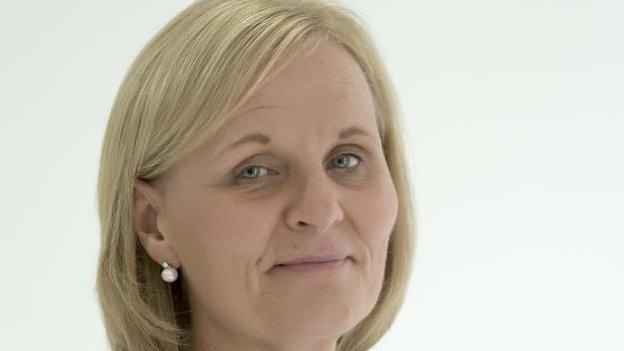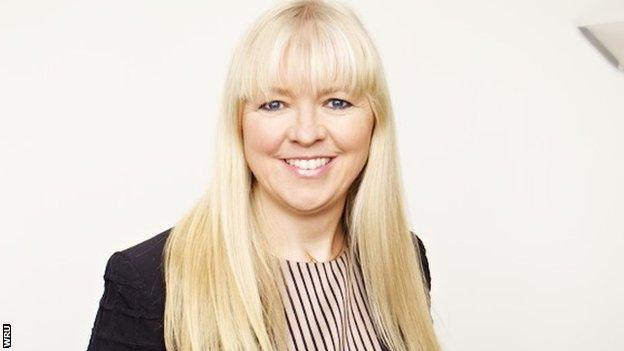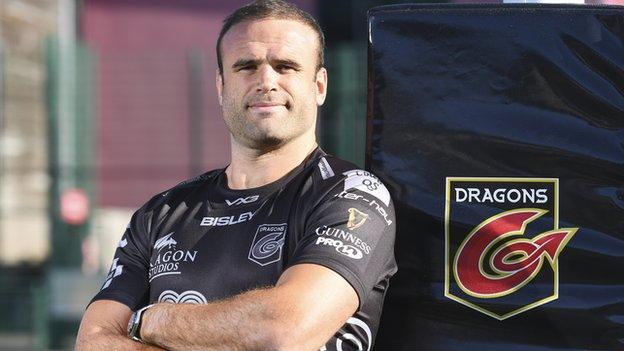Amanda Blanc: PRB chair outlines Welsh rugby vision after 'brutal' period
- Published

A former chief executive at Zurich Insurance, Amanda Blanc became the third woman to join the Welsh Rugby Union board
Professional Rugby Board (PRB) chair Amanda Blanc says she is committed to the four Welsh regions surviving the coronavirus pandemic.
The PRB was created in 2018 and is responsible for running professional rugby in Wales, representing the regions and Welsh Rugby Union.
Blanc was appointed to the role in December 2019 and says she believes in the regions' future.
"That was my aspiration at the start and is my aspiration now," said Blanc.
Blanc, who is originally from Treherbert and was appointed the PRB independent chair after replacing David Lovett, has outlined how the organisation has changed following the effect of Covid-19.
"When I took the role everything seemed normal in the world, the funding and everything else was fairly settled," said Blanc.
"This (rugby) is unlike many other environments because your revenue was effectively completely switched off overnight.
"It's brutal, circumstances changed immediately. The PRB's purpose was to promote professional rugby in Wales and make it a success, suddenly the purpose became Welsh professional rugby's survival."
The future remains uncertain with Wales unsure whether they will host internationals in front of crowds in 2020 or how long the regions will be playing behind closed doors.
"It's impossible to say what is going to happen and we have run so many different scenarios," added Blanc.
"This situation can't carry on for a very long time because things like crowds, television and merchandise revenue and sponsorship are so important.
"Crowds, especially at the Principality Stadium, have gone and all the revenue with it. Even in the new normal world, whatever that might be, we don't know when that will return because we don't have a vaccine."
During lockdown, Blanc also became the new Aviva chief executive in July 2020 and combines that role with the PRB voluntary position.
The PRB board is made up of the four professional chairs, two WRU members and two independent voices. In virtual meetings, regions have been battling for their own business interests, while trying to maintain collective agreements.

Amanda Blanc is joined on the PRB board by fellow independent member Marianne Okland (pictured) alongside Alun Jones (Cardiff Blues), David Buttress (Dragons), Robert Davies (Ospreys) and Nigel Short (Scarlets), along with departing WRU chief executive Martyn Phillips and incumbent chief executive Steve Phillips
"There are things that frustrate you enormously about that and things you love," said Blanc.
"The regional chairs and Martyn Phillips and Steve Phillips have huge passion about what they do.
"You want these people to be tribal and competitive, fight for what is right for their teams and businesses, that's brilliant. The people are charismatic, real characters, that's what I like.
"When you bring all that together, passionate people with strong opinions, there is an energy.
"There have been moments though I have had my head in my hands, thinking what will happen next. It's frustrating because everybody wants success.
"The point of being an independent chair is I can be just that. I can sit back, call things out and say we need to come to an agreement and we have been able to do that.
"You don't do things because they're easy. The plan is to do great things in a difficult environment. We have started ok but there is more to do."
The most challenging aspect has been the funding loss for Cardiff Blues, Dragons, Ospreys and Scarlets following the devastating lack of WRU revenue.
The WRU has an annual turnover of £90m with more than half of that generated by international matches. After funding itself, the WRU provides a ring-fenced community game investment of £11.7m while the regional allocation goes through the PRB.
It is understood a projected £26m was allocated for the four sides for the 2020-21 season, pre Covid-19, but that has fallen to less than £4m.
'I've challenged and checked and questioned' - Liza Burgess
The WRU is seeking to address this with a £20m loan divided between the four regions who will each be liable to repay the debt, a policy announced in June by departing WRU chief executive Martyn Phillips.
Blanc has refused to reveal any official financial figures but outlined the funding process.
"I won't go into the numbers because they have not been officially published anywhere and in any business there is sensitivity," said Blanc.
"I will explain the mechanism with money coming at the top of the funnel into the WRU in terms of the international game and revenues it provides. The WRU then has money to allocate to the professional and community game.
"The community game is ring-fenced, so money at the top of the funnel has a disproportionate impact on the professional game than the community game.
"The money allocated out to the professional game has been switched off since March. The WRU has had a massive revenue decline and we don't know what the new season is going to look like.
"These depleted funds are allocated to the regions and money is not the same as it was.
"In June, Martyn made it clear there would not be enough money and we would need to seek financing. That loan is not finalised but the regions and WRU have been working hard to secure the financial future.
"I won't say how much each region will get, they will get what they need from the loan. Any organisation that takes on a loan is a burden.
"Everybody has been taking tough decisions. Players, coaches and people in the regions and WRU have taken salary reductions, this is a tough time."
Under normal circumstances, the PRB operates a distribution mode with payments weighted based on set criteria, including the number of players provided to the new elite 38 Wales players system.
This can mean the money is not split equally four ways between the regions.
"It's a clear model that everybody signed up to how the money is allocated," said Blanc.
"The amounts have changed because we don't have the money now we had before (Covid-19).
"When we were projecting the 2020-21 season in January, we thought the internationals would be played, sponsorships would be normal and people would be turning up to games, but that's not been the case.
"The money is nowhere near what it was originally. That's why we have to find alternative ways to get through this difficult period."
That has included regional players taking a 25% pay cut over 12 months. In April, the PRB reached an agreement with the Welsh Rugby Players' Association (WRPA) over a three-month salary reduction.
The regions have since been negotiating with their own squads over further cuts, after a long-term collective agreement with the WRPA and PRB could not be reached.
"It would have been fantastic to have come to an agreement with PRB and WRPA, one agreement would have been better, but we could not get there," admitted Blanc.
"It was not through the want of trying, we spent hours talking about this and I believe we came up with a great framework which was then implemented by the regions."

Dragons have announced the signings of Jamie Roberts, Nick Tompkins and Jonah Holmes during the 2020 summer
Some regions were frustrated by other sides signing players when there were suggestions there had been a recruitment freeze agreed by the PRB during the pandemic.
Dragons still managed to sign players like Wales centre Jamie Roberts this summer. So was there an agreement?
"I am not getting drawn into individual circumstances around players," said Blanc.
"We have talked a lot about recruitment over the last few months, particularly given the uncertain situation we are in.
"Recruitment doesn't just happen overnight. Conversations take months, so it's easy to say this has happened and was outside any agreement, etc.
"You need to understand what's gone on in the background. There's always two sides to every story, which you don't always get on social media."
Despite the challenges, Blanc insists the PRB is fit for purpose and believes it represents Welsh rugby's future.
"Why would we give up on something we've only just started?" asked Blanc.
"We haven't had the opportunity to make it work yet. This creation is better than people trying to do things individually.
"The contract and intent is clear, it's a massive opportunity to make Welsh professional rugby successful.
"We've been dealt a difficult starting position but so has the rest of the world. If you look around, there are not many better alternatives.
"What we have, we have to make work."